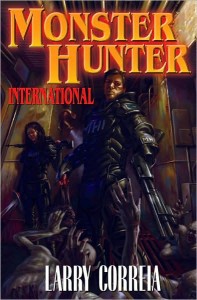 When full-time accountant and part-time gun nut Owen Zastava Pitt discovers, the hard way, that his boss is a werewolf, and ends up winning the fight by tossing said werewolf out of a fourteenth story window to its death, he’s irrevocably plunged into a world where the strong and heavily-armed survive. It seems there’s a whole lot of monsters out there, including werewolves, vampires, zombies and sea monsters, and a thriving business in hunting them, thanks to the secret bounties paid out by a little-known government fund. Monster Hunters International is the oldest, biggest, best of the firms out there, and they want Owen to join the team, based on his ability to handle himself in a fight. It soon turns out that Owen was born for this sort of work. Slaughtering flesh-eating critters is a far better fit for his talents than accounting ever was, and it doesn’t hurt that he’s got a crush on the boss’s granddaughter, Julie Shackleford.
When full-time accountant and part-time gun nut Owen Zastava Pitt discovers, the hard way, that his boss is a werewolf, and ends up winning the fight by tossing said werewolf out of a fourteenth story window to its death, he’s irrevocably plunged into a world where the strong and heavily-armed survive. It seems there’s a whole lot of monsters out there, including werewolves, vampires, zombies and sea monsters, and a thriving business in hunting them, thanks to the secret bounties paid out by a little-known government fund. Monster Hunters International is the oldest, biggest, best of the firms out there, and they want Owen to join the team, based on his ability to handle himself in a fight. It soon turns out that Owen was born for this sort of work. Slaughtering flesh-eating critters is a far better fit for his talents than accounting ever was, and it doesn’t hurt that he’s got a crush on the boss’s granddaughter, Julie Shackleford.
Before long, it turns out that monster activity’s up for a reason: something very old and very mean has been plotting for centuries, and all the pieces are falling into place. It’s your standard apocalyptic scenario, complete with Lovecraftian elder gods, a doomed expedition of Spanish conquistadors, unstoppable vampires, and prophetic dreams. Can Owen Z. Pitt kick some ass, shoot some monsters, and win the girl? Oh yeah. He’s got it. Provided he doesn’t blow up the world by accident, or break time and space.
Monster Hunters International is an over-the-top, gleefully loony homage to B-movie action/adventure, the sort of thing John Ringo might write on a slow day, or like what Nick Pollata did in his Bureau 13 series some years back. It’s a mixture of hardcore combat sequences and male wish-fulfillment power fantasies, interspersed with more violence and mythology gone wild, written by someone who very clearly knows his guns and action movies inside-and-out. (Though as convincingly as Correia writes the action, he fails to grant that same level of intensity or believability to scenes set in a mental institution. One can almost imagine him dismissing such intellectual things as so much froo-froo, and is it time to blow stuff up again, why yes it is…)
I’ll admit, I loved this book because it has a strange charm. It’s unapologetic in its gun-toting masculinity, and in many ways it’s a throwback to an era when all it took to conquer the universe was a jetpack and a strong sword arm. (Am I mixing my examples again?) It’s not refined, not polite, probably not politically correct, by no means sensitive or enlightened, and I’m pretty sure the author had a crush on the Baroness back in the ’80s (like so many of us did). Others might find fault in this book for those things it lacks, but nevertheless, it was a lot of fun. And, at a mere 700+ pages, it’s a supersized amount of fun. Toss this one on the pile of guilty pleasures, and I’ll see you for the sequel.
